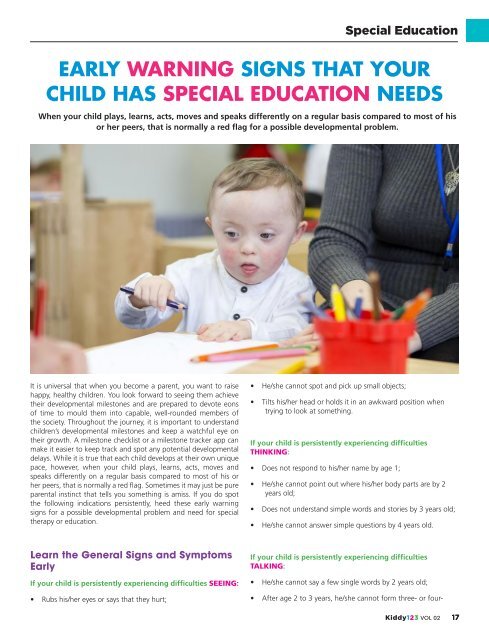all pages
You also want an ePaper? Increase the reach of your titles
YUMPU automatically turns print PDFs into web optimized ePapers that Google loves.
Special Education<br />
EARLY WARNING SIGNS THAT YOUR<br />
CHILD HAS SPECIAL EDUCATION NEEDS<br />
When your child plays, learns, acts, moves and speaks differently on a regular basis compared to most of his<br />
or her peers, that is norm<strong>all</strong>y a red flag for a possible developmental problem.<br />
It is universal that when you become a parent, you want to raise<br />
happy, healthy children. You look forward to seeing them achieve<br />
their developmental milestones and are prepared to devote eons<br />
of time to mould them into capable, well-rounded members of<br />
the society. Throughout the journey, it is important to understand<br />
children’s developmental milestones and keep a watchful eye on<br />
their growth. A milestone checklist or a milestone tracker app can<br />
make it easier to keep track and spot any potential developmental<br />
delays. While it is true that each child develops at their own unique<br />
pace, however, when your child plays, learns, acts, moves and<br />
speaks differently on a regular basis compared to most of his or<br />
her peers, that is norm<strong>all</strong>y a red flag. Sometimes it may just be pure<br />
parental instinct that tells you something is amiss. If you do spot<br />
the following indications persistently, heed these early warning<br />
signs for a possible developmental problem and need for special<br />
therapy or education.<br />
• He/she cannot spot and pick up sm<strong>all</strong> objects;<br />
• Tilts his/her head or holds it in an awkward position when<br />
trying to look at something.<br />
If your child is persistently experiencing difficulties<br />
THINKING:<br />
• Does not respond to his/her name by age 1;<br />
• He/she cannot point out where his/her body parts are by 2<br />
years old;<br />
• Does not understand simple words and stories by 3 years old;<br />
• He/she cannot answer simple questions by 4 years old.<br />
Learn the General Signs and Symptoms<br />
Early<br />
If your child is persistently experiencing difficulties SEEING:<br />
• Rubs his/her eyes or says that they hurt;<br />
If your child is persistently experiencing difficulties<br />
TALKING:<br />
• He/she cannot say a few single words by 2 years old;<br />
• After age 2 to 3 years, he/she cannot form three- or four-<br />
Kiddy123 VOL 02 17



